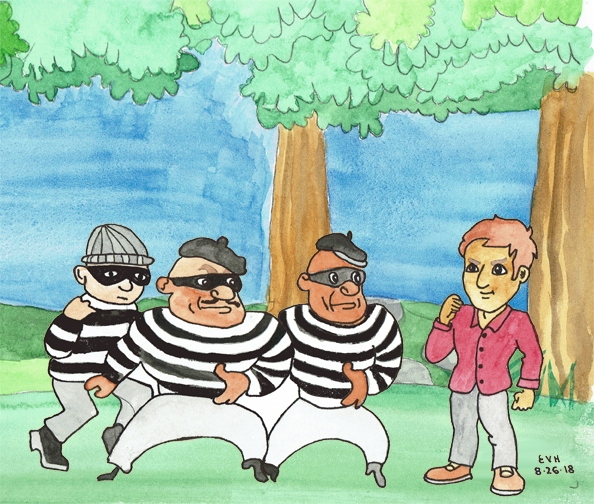
Jataka 79
Kharassara Jātaka
The Minister’s Treachery
as told by Eric Van Horn
originally translated by Robert Chalmers, B.A., of Oriel College, Oxford University
originally edited by Professor Edward Byles Cowell, Cambridge University
So many of these stories tell us how little has changed in 2500 years. From a Buddhist perspective that is not surprising. Beings are born into the human realm because they have a certain kind of karma. Having said that, the human realm does go through periods when things are better and periods when things are worse. Within the parameters of the realm, there is some latitude for change.
“He gave the robbers time.” This story was told by the Master while at Jetavana. It is about a certain minister. This minister, it is said, ingratiated himself with the King. And after collecting the royal revenue in a border village, he conspired with a band of robbers to march the men of the village into the jungle, leaving the village for the rascals to plunder. This agreement was made on the condition that they give him half of the plunder.
Accordingly, at daybreak when the place was left unprotected, down came the robbers. They killed and ate the cattle, looted the village, and were off with their plunder before he came back in evening with his followers. But it was a very short time before his mischief leaked out and came to the ears of the King. So the King sent for him, and, as his guilt was obvious, he was disgraced, and another man was put in his place.
Then the King went to the Master at Jetavana and told him what had happened. “Sire,” the Blessed One said, “the man has only shown the same character now that he showed in bygone days.” Then at the King’s request he told this story of the past.
Once upon a time when Brahmadatta was reigning in Benares, he appointed a certain minister to be in charge of a border village, and everything came to pass as in the above case. Now in those days the Bodhisatta was making the rounds of the border villages in the way of trade, and he had taken up residence in that very village. And when the headman was marching his men back at evening with drums beating, he exclaimed, “This scoundrel, who conspired with the robbers to loot the village, waited until they went off to the jungle. And now back he comes with drums beating, pretending to be ignorant of anything having gone wrong.” And, so saying, he uttered this stanza:
He gave the robbers time to drive and slay
The cattle, burn the houses, capture people.
And then with drums beating, home he marched,
A son no more, for such a son is dead.
(A son who is so shamed ceases to be a son, and his mother is sonless even while her son is still alive.)

Figure: The Conspirators!
In such a way the Bodhisatta condemned the headman. Not long after his treachery was discovered, the rascal was punished by the King as his wickedness deserved.
“This is not the first time, sire,” the Master said, “that he has been of this character. He was the same in bygone days as well.” His lesson ended, the Master showed the connection and identified the birth by saying, “The headman of today was also the headman of those days, and I was the wise and good man who recited the stanza.”
